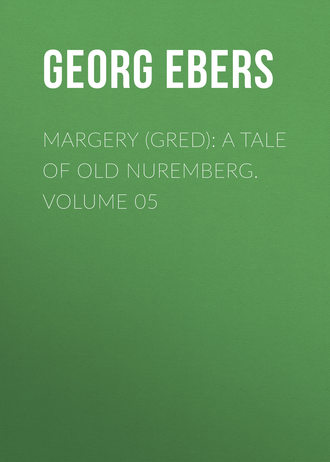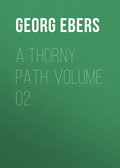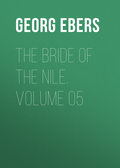
Georg Ebers
Margery (Gred): A Tale Of Old Nuremberg. Volume 05
He sang the last words to himself as it were, and vanished, seeing certain persons of the Court.
Now I took this well-meant warning as it was intended; and albeit Ann and I were heartsick with longing to see Herdegen and to release him from his hiding, we nevertheless took patience. The legal guardians of our estate, having my uncle's consent, took my Cousin Maud's suretyship, and expressed themselves willing to pay the fine out of the moneys left by our parents, into the Imperial treasury. And that which followed thereafter showed us how wise the Fool's admonition had been.
The knight, Sir Apitz von Rochow, who had served as Junker Henning's second in the fight, tarried yet in Nuremberg, and this rude, arrogant youth had devoted himself with such true loving-kindness to the care of his young cousin, at first in the priest's house at Altenpero and afterwards in the Deutsch-haus in the town, that he had taken no rest, day nor night, until the Junker's father came, and then he fell into a violent fever. It was but of late that the leech had granted him to go out of doors, and his first walk was to our house to show me his sorrow for my grief, and to thank my cousin for many pleasant trifles which she had sent to him and the Junker during their sickness, to refresh them. At the same time he broke forth in loud and unstinted wrath against Sir Franz von Welemisl, and gave us to wit that with his whole heart he grudged him the fair Ursula, whose favor he himself had so diligently sued for since the first days of the Diet. From our house he went to the Tetzels', and then he and the Bohemian forthwith came to high words and defiant glances.
Shortly after this, and a few hours only after my brother's penalty had been paid into the Treasury, the two young gentlemen met in the nobles' wine-room by the Frohnwage, and von Rochow, heated by wine and heeding neither moderation nor manners, began to taunt Ursula's betrothed. After putting it to him that he had left the task to Herdegen of picking up the glove, "which peradventure he had thought was of too heavy leather," to which the other made seemly reply, he enquired, inasmuch as they were discoursing of marriage, whether the Church, which forbids the joining of those who are near of kin, hath not likewise the power to hinder a young and blooming maid from binding herself for life to a sickly husband. Such discourse was ill-pleasing by reason of the Bohemian's presence there: and the Junker went yet further, till to some speech made by old Master Grolaud, he made answer by asking what then might be a priest's duty, if the sick bridegroom failed to say "yes" at the altar by reason of his coughing? And as he spoke he cast a challenging look at Welemisl.
The hot blood of the Bohemian flew to his brain; or ever any one could hinder him, his knife was buried to the hilt in the other's shoulder. All hastened to help the Brandenburger, and when presently some turned to seize the criminal he was no more to be seen.
This dreadful deed caused just dismay, and most of all at Court, inasmuch as the chamberlain and the maid of honor in close attendance on their Majesties' persons were near kin to the Bohemian, whose mother was of the noble Hungarian house of Pereny.
As to the Emperor, he flew into great fury and threatened to cancel the murderer's coat of arms and punish him with death. Never within the peace of his realm, nay and under his very eyes, had so much noble blood been shed in base brawling as here in our sober city, and he would forthwith make an example of the guilty men. He would make young Schopper pay some penalty yet more than a mere fine, to that he pledged his royal word, and as for young Welemisl, he was minded to devise some punishment that should hinder many an over-bold knight from drawing his sword! And he commanded that not only his own constables and men-at- arms, but likewise the town bailiffs, should forthwith seek and take both those young men.
Only two days later Sir Franz was brought in by the city watch; he had dressed himself in the garments of a waggoner, but had betrayed himself in a tavern at Schwabach by his coughing. Howbeit his Majesty had by this time come to another mind; nay, Queen Barbara left him less peace than even the court-folks, for indeed her father, Count Cilly, was near of kin to the Perenys, and through them to the Welemisl.
The Emperor Sigismund was a noble-minded and easy-living prince, who once, when forty thousand ducats had been poured into his ever-empty treasure chest, divided it forthwith among his friends, saying: "Now shall I sleep well, for that which broke my rest you bear away with you." And this light-hearted man, who was ever tossed hither and thither against his will, now saw that his peace was in evil plight by reason of Sir Franz. This was ill to bear; and whereas his royal wife called to mind in a happy hour that Welemisl had been provoked out of all measure by Rochow's scorn, and had done the deed out of no malice aforethought but, being heated with wine, in a sudden rage, and that he was in so far more worthy of mercy than young Schopper, who had shed noble blood with a guilty intent, counting on his skill as a swordsman, the Emperor surrendered at discretion. In this he was confirmed by his privy secretary, Caspar Slick, whom the Queen had beguiled; and this man, learned in the law, was ready with a decision which the Imperial magistrate gladly agreed to forthwith, as mild yet sufficient. Matters in short were as follows: About ten years ago the Knight Sir Endres von Steinbach had slain a citizen of Nuremberg in a fray with the town, and had made his peace afterwards with the council under the counsel of the Abbot of Waldsassen: by taking on himself, as an act of penance, to make a pilgrimage to Vach and to Rome, to set up stone crosses in four convents, and henceforth to do service to the town in every quarrel, in his own person, with a fellowship of ten lances for the space of two years. All this he had duly done, and it came about that the Emperor now condemned the Bohemian and my brother both alike to make a pilgrimage, not only to Rome—inasmuch as their guilt was greater than Steinbach's— but likewise to Jerusalem, to the Holy Sepulchre and other sacred places. Welemisl was to pay the same penalty in money as Herdegen had paid, and in consideration of their having thus made atonement for the blood they had shed, and as their victims had escaped death, they were released from the doom of outlawry. On returning from their pilgrimage they were to be restored to their rank and estates, and to all their rights, lordships, and privileges.
Not long after this sentence was passed the Court removed from Nuremberg through Ratisbon, where the Emperor strove to make up his quarrel with the Duke Bavaria and then to Vienna; but ere his departing he gave strait orders to the chief magistrate to see that the two criminals should fare forth on their pilgrimage not longer than twenty-four hours after the declaration of their doom.







